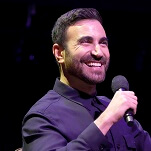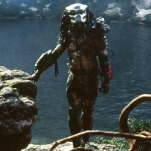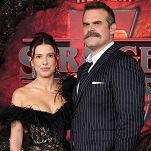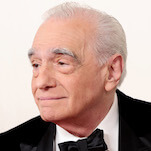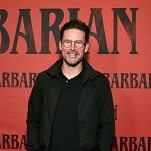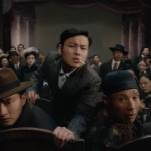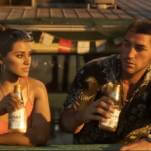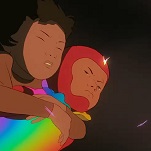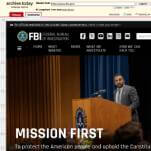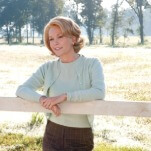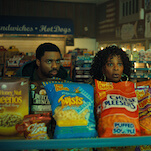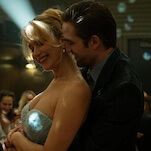It’s nice, for example, that with the season-long story nearing its end, credited writer Doug Petrie found time to show Willow and Tara talking about their plans for sophomore year, while playing with the cutest kitten ever born. It’s nice also that Spike takes a moment to warn Adam that as unstoppable as he may seem, Buffy has a way of “bollixing up the plans of every would-be bad-ass who sets foot in this town.” And it’s nice that Giles is given another chance to sing (even if “Free Bird” doesn’t really seem like the kind of song Ripper would dig).
Then Buffy goes out on patrol, intersects with Forrest, and both of them meet up with Adam, who promptly skewers Riley’s best bud. And as if Riley’s day weren’t already bad enough, his chief romantic rival Angel shows up in town, looking to apologize to Buffy for kicking her off his show. Angel and Riley tussle in the streets, then converge on Buffy’s dorm room, where she takes command of the situation by reminding both of them that she could kick both their asses. Another cool moment.
And yet I’m ultimately a little hesitant to hail “The Yoko Factor,” for a couple of reasons. First, there’s no real reason for Angel to be in Sunnydale, beyond giving Riley a chance to get worked-up about it. He said what he needed to say to Buffy in “Sanctuary,” and I really don’t think he needed to apologize or seek closure. But maybe that’s just me. I’m always happy to see Angel on Buffy, but this crossover seemed a little forced.
Also forced? The late-in-the-season emotional arc that Petrie and the other writers seem to be imposing on our main characters. The title of this episode refers to Spike’s plan to make Buffy easier pickings for Adam by separating her from Willow, Giles and Xander. Spike starts a whisper campaign, letting Xander know that everyone thinks he’s aimless, and Willow know that everyone’s sick of her Wicca ways, and telling Buffy that everyone thinks she’s become too distant. (Buffy’s pissy, dismissive response: “There’s no ancient prophecy about a chosen one and her friends”) Spike’s plan works because he’s saying things that everyone in the group actually is thinking and feeling, even if they haven’t been able to express it. My problem with how this plays out in the episode is that as with a lot of Season Four, everything happens so fast. I get why the writers want to rip apart then reunite our heroes—and I’ll get more into it below, in the “Primeval” section—but even though these characters’ problems have been present all season, they haven’t been really been foregrounded enough to provide much of a payoff. Again, to me.
Nevertheless, I felt like all the extended chatter in “The Yoko Factor” rang essentially true, and I thought Petrie may have snuck in an accidental truth in the reconciliation scene between Buffy and Riley. “I’m so in love with you I can’t think straight,” he tells her, and she responds, “Tell me about it.” That line could be read—and is probably meant to be read—as Buffy telling Riley she loves him right back. But I read it as an expression of vanity. “Yes, I am great, aren’t I? Tell me more.” Which is wholly appropriate. One of the things that makes Buffy such a complex show is that the heroine, by the nature of her job, has to be a bit of a self-absorbed jerk. And that’s nearly always been the cost of excellence.
Right at the end of “The Yoko Factor,” Riley walks into Adam’s cave, where the monster has been waiting for him. Did I think for a second that the two were in cahoots? Nah. Turns out that Professor Walsh attached a chip to Riley’s central nervous system which now puts him under Adam’s control—bodily, if not mentally. And that’s significant. While Adam’s constructing an army of super-powered zombies—including a Zombie Walsh—he’s been primarily concerned with making sure they’re physically able to perform. But where are their minds?
As I said, last episode was about giving Buffy, Giles, Xander and Willow a chance to air their grievances, and perhaps in the process to let frustrated fans know that the writers are aware the characters have changed this season, for better or worse. This episode is about bringing the group back together, and imbuing their mission with some emotion. I still think the whole process felt rushed, but that doesn’t mean I wasn’t touched by Anya comforting Xander by calling him “a good person and a good boyfriend,” or by Buffy and Willow’s big “you’re my best friend” conversation as they lowered themselves down an elevator shaft and into the belly of The Initiative.
And speaking of The Initiative, I felt “Primeval” answered some lingering questions I had about the nature of the organization and Walsh’s mission within it. The bossy Colonel McNamara revealed his ignorance of what’s really going on in the previous episode when he referred to Buffy as “just a girl,” and in this episode he seems utterly confused when Buffy explains what Adam is up to right under The Initiative’s nose. (“What secret lab?” the Colonel huffs.) He scoffs that with all the technology at The Initiative’s command, the Scoobies are planning to beat the bad guy with a gourd—“a magic gourd,” Giles adds—and he promptly puts them all under arrest, though they don’t stay under arrest for long.
Adam meanwhile, has hatched his plan to load The Initiative’s holding cells up with beasties and then set them free to wreak havoc. (A lot of the mayhem is caught by surveillance cameras, and the footage reminded me a lot of something out of a George Romero film.) To counter, Giles, Willow and Xander work a spell that has their spirits joining with Buffy’s and giving her the strength to defeat the monster. The final showdown is very well-staged and edited, with some exciting cross-cutting, a budget-priced version of The Matrix’s “Bullet Time,” and a cool effect where Buffy turns ammo into birds. But it also tied into the main theme: Buffy and company prevailed because they wanted it more. They were invested in the outcome more than Adam and his rampaging crew.
All in all, this was about as good an exit imaginable for a promising plotline that had been otherwise botched. (“The experiment has failed,” one shadowy government agent says, summing up The Initiative in more ways than one.) I wouldn’t call this ending “satisfying,” but it was entertaining at best, workable at worst. Or, to quote Spike, “Everything is all right and we all get to be not staked through the heart. Good work, team.”
“Restless”
And so we come to “Restless,” in which Joss Whedon’s love of a good dream sequence culminates in a full-on dream-episode, albeit one with a plot. The core gang gathers at Joyce’s house to hang out and watch movies (on videocassette!… this is definitely the year 2000), and when they fall asleep, they’re haunted by the spirit of The First Slayer, who’s upset at being roused by Giles and company during the spell they used to beat Adam. Buffy, however, is unimpressed with her ancestor. “You’re not the source of me,” she snaps, before waking up and breaking the First Slayer’s hold on everyone.
So that’s the plot of “Restless,” but it’s hardly the point. The point is twofold. First, the episode is a tour of each character’s subconscious, in the tradition of the classic M*A*S*H* episode that made dream studies a TV staple (with a twist of Twin Peaks). I imagine the cast must’ve loved having a chance to venture wildly off-model and wear funny costumes and just generally play. In Willow’s dream, for example, Amber Benson gets to lounge around naked and get her back painted, while the rest of the cast gets to pretend to be characters in Oklahoma, Chicago and… I’m going to guess Heidi for Mercedes McNab. (I love Marc Blucas’ enthusiasm as an Oklahoma character: “I showed up on time so I got to be Cowboy Guy!”) In Xander’s dream, James Marsters and Anthony Stewart Head get to swing as high as they can—“a Watcher scoffs at gravity,” Giles whoops—while Emma Caulfield gets to pretend to steer an ice cream truck by "gesturing emphatically." In Giles’ dream, Caulfield tells a matter-of-fact joke—“it was the duck and not the man that spoke” is the punchline—while Head sings his usual let's-make-a-plan dialogue, rock opera style.
On one level, “Restless” is almost a parody of the self-indulgent TV dream episode, as exemplified by the recurring appearance of a man bearing a tray of sliced cheese. (“I wear the cheese. It does not wear me.”) And one level it’s a little self-indulgent in its own right. But Whedon—who wrote and directed—really gets what dreams are like. Willow’s anxiety over being forced into a play that she hasn’t rehearsed is a dream I’ve had myself, and I loved the plausible nonsense of it all. (“Everyone that Willow’s ever met is out there in that audience, including all of us.”) The key to a good dream sequence is the mix of the absurd and the plausible. You’re watching Apocalypse Now, but it doesn’t look quite right. Your mother is living in the walls of your school. If you gave these things a moment’s thought, you’d be wrenched out of the dream and you’d probably wake up. But while they’re happening in the dream, they make a weird kind of sense.
But the main thing that Whedon gets right about dreams—and the second main point of the episode, in my opinion—is that they’re often about how we’re trying to get somewhere and yet never arrive, because we get sidetracked or transported somewhere else. I don’t want to oversell this, but I almost feel like these last handful of Season Four Buffy episodes were a tacit admission to the fans that the show hadn’t been as consistently strong as it could’ve been, coupled with a promise to get back to basics. And somewhere in the hairpin turns and unexpected dead ends of“Restless,” I saw Whedon making his excuse. What happens in this episode could be read as a metaphor for the way TV shows get made. You start out confidently in one direction, and the next thing you know you’re standing naked in front of a bunch of people who are expecting you to peform.
Overall thoughts:
For all my grumbling about how poorly Whedon and company developed the Adam/Initiative storyline, I think they did a decent job of bringing it to a conclusion. And it was especially smart to end it an episode before the finale, to allow Whedon to give the fans a little something special as a reward for their patience—a reminder of why they liked the show in the first place, and encouragement to return for Season Five. Which I shall eagerly do myself, starting in… oh, let’s say mid-May 2010. (Depending on when Lost ends.) See you then!
Stray observations:
-Whatever my qualms about Adam as a character, I was always impressed with his costume/make-up. When George Hertzberg showed up in “Restless” without make-up, it took me a minute to recognize him.
-So, are Willow and Tara, y’know, doing it? Or is the relationship still too new? (Also why didn’t we get to see them kiss in Xander’s “Restless” dream? Lame.)
-Xander, praising Spike’s inhibitors: “Give it up for American chipmanship.”
-Giles, taking his own turn to mock Spike’s abilities to fight: “Gave them a good running away, did you?”
-Spike, admiring Adam’s can-do spirit: “You’re like Tony Robbins if he was a big, scary, Frankenstein-looking… You’re exactly like Tony Robbins.”
-Xander, defending Angel to Riley: “It’s not like I hate the guy. Just, you know, the guts part of him.”
-Angel reminds Buffy of the rules when she offers a tepid “I guess” to his question of whether he can come in to her room. “I’m going to need a little more than that.”
-Sometimes Marc Blucas reminds me a little of a less doughy Seth Rogen, just in his facial expressions and inflections.
-Blucas is very funny though when he stands to Angel and Buffy, swearing repeatedly, “I’m not leaving this room,” even after Angel and Buffy shrug and leave themselves.
-Buffy, cursing Xander’s name: “He is the deadest man in Deadonia.”
-Riley’s worried that Buffy might’ve cheated on him when she went to see Angel, and though she didn’t cheat on him that time, it is sort of ironic that she had sex with Angel on a previous trip to L.A. and has no memory of it. (Wait, maybe “ironic” isn’t the word I’m looking for. “Tragic.” Yeah, that’s it.)
-A drunken Giles doesn’t like being compared to Batman’s butler. “I am no Alfred, sir. Alfred had a job.”
-Xander, speaking for the fans: “Does anyone here miss The Mayor?”
-Willow gets frustrated that The Intiative’s files decrypted themselves before she could finish cracking them. But then she adds, desultorily, “I mean, ‘Yippee, we have the information.’”
-Was that actually Lindsay Crouse as Zombie Walsh? She’s listed as appearing in the episode, but it almost looked like an actress in an impressive Crouse mask.
-Giles, to Xander: “Just because this is never going to work, that’s no reason to be negative.”
-Interesting how many episodes in Season Four have titles that could apply to other episodes. “Primeval” is a case in point. That could be the finale’s name as well.
-I was really thrown by the opening of “Restless,” which reverses the cold open/opening credits order.
-Xander, defending Apocalypse Now: “It’s the feel-good movie of whatever year it was.”
-Cameo appearances in the “Restless” dreams by Oz, Olivia and Harmony. The first two make sense, but the last one was kind of random.
-Willow’s dream is haunted by a slow-mo Miss Kitty Fantastico.
-Willow’s dream version of Death Of A Salesman includes dialogue like, “I’ve come looking for a man… a sales man.”
-Xander, in Willow’s dream, foreshadowing his own: “Sometimes I think about two women doing a spell, and then I do a spell by myself.”
-In Buffy’s dream, she’s back to making the bed she made with Faith in their shared dream. Interesting.
-“Restless” is the second Buffy episode in a row that Whedon has directed where the villain truly looks nightmarish.
-Joyce, after saying how nice it was to finally meet Riley: “Did you notice how pointedly I said ‘finally?’”
Angel notes:
While the final three Angels of Season One weren’t as thematically rich as the Faith two-parter that preceded them, the season still finished strong, with some well-plotted, well-staged episodes that showed the writers and the cast getting into a real groove, and starting to steer the show towards serialized adventure rather than the case-a-week supernatural procedural route. Wolfram & Hart develops more character and detail as an adversary in the second half of the season, and here at the tail-end we meet some new characters who seem to have long-term potential for the show: lonely billionaire David Nabbit and street-savvy vampire hunter Charles Gunn. Add in Dennis and Kate and you’ve got a solid background cast for our core trio, especially now that Wesley’s began to evolve from slapstick bumbler to sage, heroic adventurer. I have no sense of whether Season Two and beyond of Angel will be like, or whether all these new castmembers will even be around for the duration, but I’m enjoying the way the creative team is expanding the Angel universe and giving it its own character, more world-weary and matter-of-fact than Buffy’s
I also find it very interesting that as the season comes to a close, Angel literally destroys much of what it had been relying on. The building housing Angel Investigations blows up. The Oracles who help connect Cordelia to The Powers That Be are slain. Cordelia softens her vanity after receiving a massive download of souls-in-crisis from The Powers (in a sequence as terrifying as anything in Angel’s first season). There’s a sense here at the end that the writers are clearing out some weeds, to give their new shoots room to grow in Season Two. And that includes the greenest shoot of all: the introduction of The Shanshu Prophecy, which seems to predict that Angel will face years of struggle then will fulfill his destiny and get his humanity back. Wesley worries in the finale about Angel’s lack of purpose; this prophecy gives him (and us) something to look forward to.
So I’m excited to move on to Season Two! But alas, I’ll have to wait until next summer. And because I’ll be giving both Angel and Buffy full write-ups when I resume (two episodes from each, each week), I may only get through Angel S2 and Buffy S5 next summer. But we’ll see how it works out. Once I pick back up, I’m hoping to have only short breaks between seasons, not 9-month layoffs. I do know it’s going to be rough waiting to get back into Angel, especially after episodes as good as these last five have been. There’s a moment in “Blind Date” where Angel sneaks past the vampire-detectors of Wolfram & Hart by having Charles Gunn set a different vampire loose in the lobby, and at that moment—as the show brought elements it had already introduced together in service of a smart, exciting action sequence—I realized that Angel had found its footing. Join me here next year as I see how far it can run.



